Fantasy Books
COVER REVEAL: Liminal Monster by Luke Tarzian

Preorder Liminal Monster over HERE
Add Liminal Monster on Goodreads
Luke Tarzian has graced us with the cover for this newest story titled LIMINAL MONSTER. Firstly here's the blurb for it

Plus here's the snazzy cover for it which has been created by the author himself

For those reviewers who might be interested to review it, the author has set up an e-ARC request form over here.
Spotlight on “The Secret Market of the Dead” by Giovanni De Feo
The Secret Market of the Dead is an Italian-inspired gothic historical fantasy about a young…
The post Spotlight on “The Secret Market of the Dead” by Giovanni De Feo appeared first on LitStack.
Book Review: Scales by Christopher Hinz
I received a review copy from the publisher. This does not affect the contents of my review and all opinions are my own.
Mogsy’s Rating: 3 of 5 stars
Genre: Science Fiction, Thrillers
Series: Stand Alone
Publisher: Angry Robot (April 8, 2025)
Length: 432 pages
Author Information: Website
Before I get into the meat of this review, I’ll admit I feel a little bit duped. When I first saw the book’s blurb pitching Scales as a perfect read for fans of Jurassic Park, I’d initially pictured rampaging dinos. The truth is actually something quite different. While I would still classify this novel as a techno-thriller, and there was no doubt some bioethical questions involved, its premise nonetheless puts it more in line with military sci-fi, super soldiers, and covert ops fiction. That said, once expectations are readjusted, you may yet find a certain appeal to this high-octane action thriller.
The story follows Eddie Boka, a U.S. soldier turned genetically modified superhuman as part of a classified military experimental program fusing human and dinosaur DNA. After going through the genetic modifications, he and three other volunteers for the program are gifted with enhanced strength, more acute senses, and scaly armor, making them deadly and durable combatants on the battlefield. However, these newfound talents also come with an unfortunate side effect. Dubbed the bloodburn, it is a primal compulsion that takes over during combat, and it strikes Eddie during his first mission. While carrying out an attack on a guerilla camp, he loses control, giving in to a violent and animalistic urge to devour one of his victims. Alarmed, the researchers behind the program realize they must address this gruesome development before introducing their dino-human hybrids to the public. After all, it would be extremely difficult to generate support if people were to find out Eddie and his peers harbor a tendency towards cannibalism.
Thus, enter Adelaide LaTour. A controversial psychotherapist, Addi is the inventor of an effective but much maligned treatment process involving conditioning with what is essentially a very powerful shock collar. By inviting her to the research complex to work with Eddie, his handlers hope that her unorthodox methods will help tamp down the bloodburn and its undesirable urges. And yet, what neither Addi nor Eddie anticipated was the bond that forms between them, one that eventually deepens into something more. Meanwhile, as their forbidden romance grows even more complex, the facility’s darker secrets are also beginning to surface. Hidden experiments that have been kept buried by the megalomaniacal scientist behind the program are ultimately exposed, threatening the future and lives of human-dino hybrid soldiers like Eddie.
From the jump, this story throws readers into a fast-paced adventure that rarely lets up. Hinz is in his element and appears most comfortable when he’s writing action like covert mission detail and close-quarter combat situations, appearing to have a strong grasp of the genre’s expectations. The book is also most compelling when it explores Eddie’s physical transformation and the bioengineering experimentation that happens behind the scenes, and there’s a subtle yet intriguing thread of ethical questions underlying this premise, exploring the issues of control, consent, and institutional overreach.
However, beyond this is where the novel starts to falter. As much fun as I had with the action, something felt missing: depth. For one, there is a distinct lack of emotional substance as characters rarely show much of themselves underneath the surface, acting more like archetypes than real people. Eddie is the tortured and noble soldier, who is good at heart but made some mistakes in his youth. Addi is the brilliant but morally ambiguous therapist, who is more concerned about her reputation than she lets on. Sure, these labels are easy enough to apply, but what led them to be this way? We don’t really know, because the story never goes deeper. Side characters are even more roughly sketched, filling cookie cutter roles like “mad scientist” or “hard-ass military commander.”
To be honest, this is all fine if you’re okay with a book equivalent of a mindless summer Hollywood blockbuster, but Scales really pushed its luck when it came to the romance between Eddie and Addi. Not surprisingly, when you put two thinly developed characters together, the result is you get zero chemistry and an unnatural, unconvincing relationship that ultimately feels like a rush job. And it’s a shame, really. It’s as though Hinz’s instincts told him his novel needed a love story, but he couldn’t quite write one in with genuine feeling.
Needless to say, the book also requires you to suspend your disbelief, though to be fair, that’s a pretty standard prerequisite when it comes to sci-fi thrillers of this type. Much of it is also entertaining, but in many ways makes it feel more like reading a comic book or watching a movie rather than a novel, and no doubt the author’s comics and screenplay writing background plays into this. Everything might feel bold and loud, yet the words are missing that special ingredient that gives the prose presence and polish.
In the end, Scales was a decent read. It’s popcorn fiction in every sense of the term, featuring big ideas, big stakes, and big action, even if it doesn’t fully commit to exploring much beyond the surface. There’s no doubt a lot of entertainment to be found here, especially if you don’t mind a bit of genre absurdity. For me, this was a perfectly average read, though I did appreciate the diversion.
![]()
![]()
7 Author Shoutouts | Authors We Love To Recommend
Support Independent Bookstores.You can find Author Shoutouts on bookshop.org at LitStack Author Shoutouts. Here are…
The post 7 Author Shoutouts | Authors We Love To Recommend appeared first on LitStack.
Spotlight on “Access” by Rebecca Grant
From the award-winning author of Birth, comes Access by Rebecca Grant, a journey into the…
The post Spotlight on “Access” by Rebecca Grant appeared first on LitStack.
Immerse Yourself in 12 Influential Short Story Novels That Epitomize the Form
Are you ready to read a collection of short stories that reads like a novel?…
The post Immerse Yourself in 12 Influential Short Story Novels That Epitomize the Form appeared first on LitStack.
THE FRUGAL WIZARD’S HANDBOOK FOR SURVIVING MEDIEVAL ENGLAND by Brandon Sanderson
Review: The Price of Power by Michael Michel (by Adam Weller)

Book links: Amazon | Goodreads
About the book: Prince Barodane could not hold back the darkness. Not even in himself. He laid an innocent city in its grave and then died a hero.
In his absence, war whispers across the land.
Power-hungry highborn dispatch spies and assassins to the shadows as they maneuver for the throne, while an even greater threat rises in the South. Monsters and cultists flock to the banners of a mad prophet determined to control reality…and then shatter it.
Destiny stalks three to the brink of oblivion.
A dead prince who isn’t dead. Barodane buried his shameful past in a stupor of drugs, drink, and crime. Now, he’d rather watch the world fall apart than wear the crown again.
An orphan with hero’s blood who's forced to make a harrowing betray her country or sacrifice her first love.
And a powerful seer who has no choice at all–her grandson must die.
If any of them fails to pay the price…
The cost will be the world’s complete annihilation.
Formats: Audiobook, ebook, paperback
REVIEW: The Price of Power is an impressive start to an intricately plotted dark fantasy saga. Michel’s writing shines with his fine attention to detail, a polished prose, and a rich, moral ambiguity where you’re never comfortable rooting for a particular side.
Two empires have been struggling for decades. One side invaded and enslaved the other, but the slaves broke free and overcame their oppressors while unifying disparate territories into a sovereign nation. But as time passed, the oppressed became the oppressors; they enacted a horrifying tradition of permanently scarring the newborns of their old enemies. There are legitimate arguments on both sides for generational hatred, and the current balance of peace vs. rebellion is teetering on the precipice of disaster.
We follow several POVs across the continent: a powerful Grandmother tasked with training a doomed young boy; an isolated princess forced to prove her worth to save the kingdom from shattering into chaos; a disgraced war veteran-turned-drug dealer haunted by madness and regret; an ally of the veteran who traded honor for loyalty; a defeated and abused pig farmer who embarks on a suicide march up a cursed mountain haunted by demons and untold power.
The vast majority of the story has very little crossover between the characters, but the threads start to weave together near the conclusion. While there was some predictably with some of the later reveals, Michel’s strong character development and emotional growth elevated the reading experience.
The pacing was also strong, as I longed to return to each POV to see what would happen next — but was never upset about switching over to the next chapter POV. There was a good balance between action, plot development, and the emotional struggles each character was facing.
This is not a short book, but it still felt like it was all about setup — characters were introduced, stakes were raised, and pieces put in place for a long, complex, and exciting journey ahead.
I wouldn’t classify this as grimdark although it’s easy to see how others might. Just be warned that this is not an uplifting book — many terrible things happen to good people, and justice is fleeting. But for those who like grit and grime and no easy solutions, this is an easy recommendation to make. I already started the prequel novella and eagerly await book two’s release.
Book Review: Feeders by Matt Serafini
I received a review copy from the publisher. This does not affect the contents of my review and all opinions are my own.
Mogsy’s Rating: 4 of 5 stars
Genre: Horror
Series: Stand Alone
Publisher: Gallery Books (May 20, 2025)
Length: 416 pages
Author Information: Website | Twitter
I just recently watched The Substance, that crazy body horror movie starring Demi Moore, and my brain still hasn’t fully recovered. It’s the kind of dark satire that relishes making you uncomfortable while shining a twisted light on our deepest societal insecurities, especially with regards to vanity and self-destruction. With Feeders by Matt Serafini: same vibes, but different angle. While the book doesn’t do sci-fi or transformational horror, it does boast its fair share of gore and follows a protagonist so desperate for validation and celebrity that she’s willing to debase herself and hurt others to get it.
The story follows nineteen-year-old Kylie Bennington, a community college student using school as a stepping-stone toward something bigger—but what she really wants is to become an online influencer. Perpetually envious of her best friend Erin who has millions of followers on social media and gets comped gifts from sponsors, Kylie is hungry for the same attention and desperate to be someone, yet that dream always seems to feel just out of reach. That is until MonoLife comes into the picture. When a clip of a former classmate’s brutal murder begins circulating online, Kylie is made aware of the underground video sharing app, which features layers of cryptic rules and user levels. Signing up is easy, but keeping your account is another story. The first rule of MonoLife is you don’t talk about MonoLife, or you will face dire consequences. The app also requires at least two daily logins or else it will delete itself, resulting in loss of access forever.
Her curiosity piqued, Kylie is quickly drawn into MonoLife’s unique but warped culture, one driven by a userbase that thrives on edgy content that pushes boundaries. Her ambition also gradually turns to obsession as she becomes addicted to unlocking the app’s special levels, which are earned by gaining more followers and clout. In time, what started as a few harmless prank videos begin escalating to more extreme stunts and vile acts. Yet her audience is insatiable—and the more depraved the content she posts, the more the algorithm rewards her with fame and material wealth. Thus, by the time the story reaches its final act, Kylie has flung herself across just about every ethical line there is.
First, let’s talk about the characters. These are all awful people, which is fine because you are definitely meant to despise and occasionally even pity them. These aren’t just morally gray personalities; some are darker than the pits of hell. Kylie, for one, is equal parts horrifying and fascinating—a vain, self-absorbed, and unstable powder keg willing to go to any length for subscribers and likes. While I had to keep reminding myself that her over-the-top characterization is by design, there’s also something disturbingly real about her zeal, considering the numerous studies showing that a large percentage of Gen Zers list social media influencer as their dream job. For what it’s worth though, Serafini even doesn’t try to redeem his protagonist, and I respect that. It makes you question if Kylie was ever a good person, or if her thirst for fame was always just lurking beneath the surface—probably the case, given her obsession with influencer culture and the way she worships her hero Katy Perry like a religion.
As for the horror, all I can say is, it works, even as several styles are vying for dominance here. On the one hand, you have bloody violence aplenty, enough to satisfy genre lovers whose tastes might run towards slasher flicks. On the other, there’s the existential dread, the why behind Kylie’s downward spiral into depravity and corruption. MonoLife doesn’t just encourage evil. It rewards it by triggering those surges of dopamine, leading to a need for increasingly higher doses for more intense engagement. Feeders is a brutal metaphor for the worst parts of social media, and watching Kylie succumb to it is a lot like watching a car crash in slow motion—you simply can’t look away.
My final verdict: Feeders is a dark and disturbing novel steeped in social commentary, one that feels especially relevant in these hyper plugged-in times. Bear in mind it’s also a satire that’s completely over-the-top and not at all shy about making you squirm. So, if you’re into bold topical horror that holds absolutely nothing back, this book might be for you. Who it’s not for are the squeamish, or for readers looking for happy endings and sympathetic characters to root for. Still, it leaves an impression, and maybe even a few lingering thoughts to chew on.
![]()
![]()
10 Days in Haunting “Ten Sleep” by Nicholas Belardes
Ten Sleep is a supernatural modern-day western about a trio of young people on a…
The post 10 Days in Haunting “Ten Sleep” by Nicholas Belardes appeared first on LitStack.
Book Review: Anji Kills A King by Evan Leikam
I received a review copy from the publisher. This does not affect the contents of my review and all opinions are my own.
 Anji Kills A King by Evan Leikam
Anji Kills A King by Evan Leikam
Mogsy’s Rating: 4 of 5 stars
Genre: Fantasy
Series: Book 1 of The Rising Tide
Publisher: Tor (May 13, 2025)
Length: 368 pages
Author Information: Website
Anji Kills a King by Evan Leikam made me realize something. Fantasy doesn’t always need grand epic battles or ancient prophecies to pull you in. Sometimes all it takes is one bold act by a single person.
The title even tells you what to expect. Anji, a young palace laundress, slits the king’s throat in the book’s opening pages, and everything that follows is one wild bloody, ride. Immediately after that spur-of-the-moment assassination, our protagonist goes on the run and is almost just as immediately apprehended by a notorious bounty hunter known as the Hawk. A member of the Menagerie, a legendary organization consisting of mercenaries who wear animal-shaped masks, the Hawk is determined to bring her prey back to face justice and collect the massive cash prize on Anji’s head. Thus, the prisoner becomes physically and magically tethered to the captor, forming a bond that neither of them wants.
Pretty soon, Anji also realizes there’s more to the Hawk’s reasons for chasing her than just gold. She’s not working with the rest of the Menagerie, for one. As they are relentlessly pursued by the Hawk’s former colleagues and other factions that want to see Anji silenced or dead, the two of them are forced to travel through some of the roughest parts of a fractured and war-torn kingdom. It’s a path littered with traps and pitfalls, and with every close call, their uneasy alliance is tested, forcing both to question who their real enemies are and what they’re willing to do to survive.
For a story featuring such epic scope and widespread conflict, Anji Kills a King feels remarkably intimate and personal. While it’s clear that our protagonist’s act of regicide has thrown more fuel on an already blazing fire of political unrest, all that chaos remains only ambient noise in the background. The real story, and what truly matters here, is the relationship between two people. We already know the world outside is falling apart, but Leikam keeps the spotlight tight on Anji and the Hawk, making their complicated relationship the core of the novel.
It helps that both our main characters are fascinating figures, just as likely to frustrate you as they are to charm you. Anji is someone who might seem a little dumb and reckless at first. After all, she kills a king on impulse, and then, instead of getting the hell out of dodge, she winds up getting caught while drinking and gambling at a tavern. The Hawk, in contrast, is all sharp edges and discipline, an older professional who doesn’t take any chances, even if it means carrying out what might seem like cruel decisions. This dynamic carries the book, especially when the tone of the story darkens and the struggle between the controller and the controlled gradually evolves into understanding and then grudging respect.
If I had any criticisms at all, it would be the plot’s tendency towards reusing the same devices. Like I said, this is a story meant to feel up-close-and-personal and relatively small-scale, so more variety is going to be needed. Anji and the Hawk end up spending a lot of time running through the same loop of evading the bad guys, narrowly escaping, getting caught, and breaking free—rinse and repeat. There are interesting moments in between, but after a while, the pattern can’t be denied. And while the writing is sharp and keeps things moving at a good speed (this was a quick and easy read), the big emotional moments don’t always feel as significant as they should. Often, it’s almost as though the book is already racing ahead to make its next big impact before the dust of the last one has even settled.
All in all, Anji Kills a King is a fast-paced, riveting debut with plenty of grit from both the story and the characters. Dig a little deeper though, and there’s a surprising amount of heart. While the novel doesn’t offer anything too new for those of us who read a lot of fantasy, Evan Leikam succeeds in delivering memorable characters and interesting world-building, even if the latter is quietly done. This is a book I would recommend to genre fans who enjoy following heroes who get into lots trouble but somehow manage to keep going anyway. I’ll be checking out the sequel.
![]()
![]()
The Old-Fashioned Way: Tove Jansson’s Hobbit Illustrations
Okay — close your eyes and visualize Middle-earth. I can’t be certain what you’re seeing behind your eyelids, but I think I have a good chance of guessing; five will get you ten that whatever you’re conjuring bears a strong resemblance to the Alan Lee Lord of the Rings book illustrations and to Tolkien’s world as envisioned in Peter Jackson’s films (on which Lee and John Howe did much of the production design).
The austere, rather chilly (once you’re out of the Shire, anyway) Lee/Howe template has become the default picture of Middle-earth for many — if not most — people, but there are other ways to view Tolkien’s realms and their inhabitants. I have already sworn my fealty to the first such visualization that I ever encountered: the beautiful Tim Kirk paintings that were featured in the 1975 Tolkien Calendar.
I am also partial to another version that’s not nearly well enough known, the gorgeous illustrations done by Michael Kaluta for the 1994 Tolkien Calendar. (Kaluta is probably best known for his comic book work, especially on the 1970’s Shadow for DC.)
One thing that makes both Kirk’s and Kaluta’s art so attractive to me is that its depiction of Middle-earth is just different from the one that has become the current standard. (Kaluta’s work is especially striking because it is so extravagantly colorful compared to Lee’s and Howe’s bleached-out work.)
Also, please understand, I — who cannot draw a straight line — am not criticizing the fine work of Lee and Howe or any other artist, merely pointing out that there are other, equally fruitful ways of looking at Tolkien’s creations.
All of which is to say that there’s more than one way to skin an orc — or draw a dwarf — and alternate visions can come from unexpected places, as I found out last Christmas when my daughter Samantha gave me a gift that was a real surprise — a Finnish edition of The Hobbit. Instead of coming from an Amazon warehouse, it came all the way from Finland (I was told that it arrived just in the nick of time), and is indeed in the exotic-looking Finnish language, which, uh… I can’t read a word of (except for “Bilbo” and “Gandalf”, which are apparently the same in Finnish, and I think I’ve figured out that dwarves are kääpiötä).
Nevertheless, it was a wonderful gift, because it’s illustrated by Tove Jansson, who was herself wonderful.
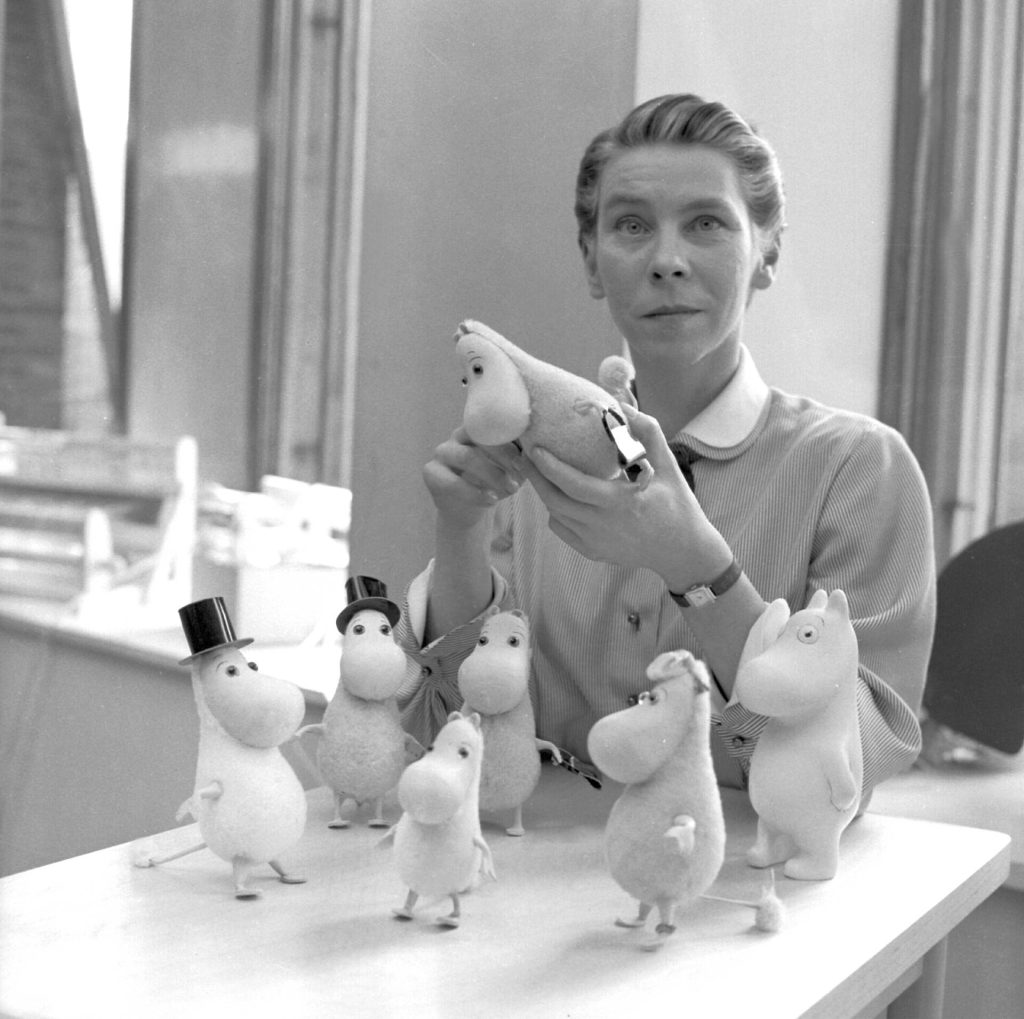 Tove Jansson and friends.
Tove Jansson and friends.
Jansson (who died in 2001) was a Finnish artist and writer who is probably best known (outside of Scandinavia, anyway) for the eight “Moomin” children’s fantasies she wrote beginning in the mid-1940’s and ending with the last volume in 1970. Set in Moominland and featuring the Moomin family and their eccentric friends (Moomins look sort of like hippos, or ambulatory marshmallows), the books are whimsical, dreamlike, gentle, satirical and sinister, all at the same time. I only recently discovered them, and I find them disquieting and delightful, which is one of the best combinations going.
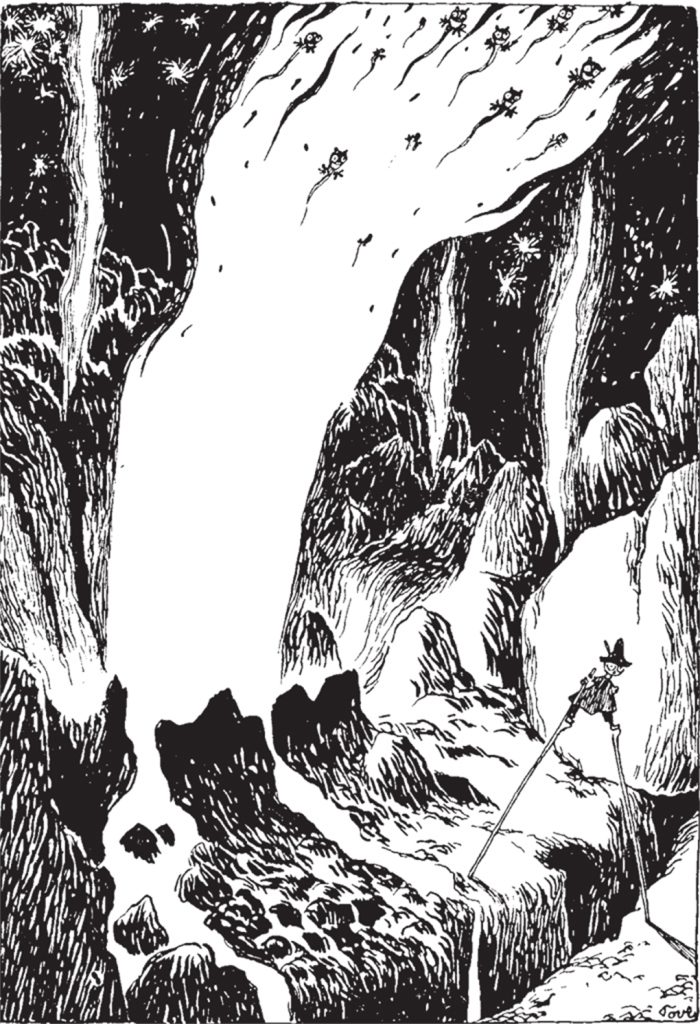 From Comet in Moominland. ©the estate of Tove Jansson
From Comet in Moominland. ©the estate of Tove Jansson
Jansson illustrated the Moomin stories herself, and her pen-and-ink drawings are some of the best things about the books. The illustrations for the first book in the series, Comet in Moominland, are especially striking; some of them are a cross between a kind of nightmare Lovecraftian landscape and the surreal imagery of William Hope Hodgson’s The Night Land.
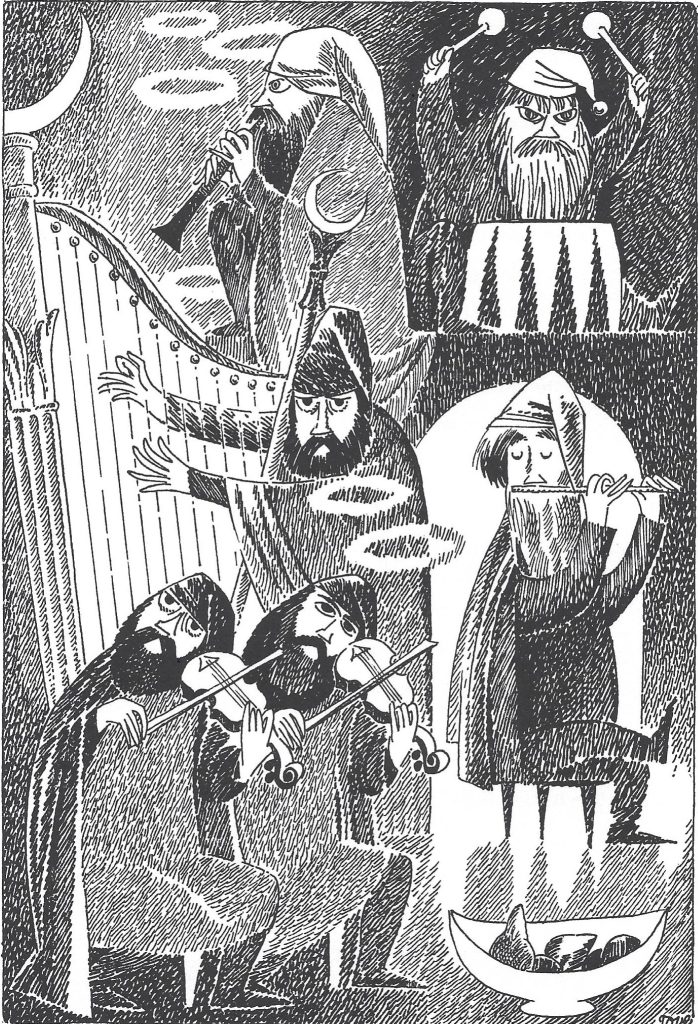 The Dwarves. ©the estate of Tove Jansson
The Dwarves. ©the estate of Tove Jansson
Though I’ve steadily been working my way through the Moomin books, I wasn’t aware until I had the Finnish Hobitti in my hands that Jansson had illustrated anyone else’s work. One look at her gorgeous cover illustration made me glad that she did. (There will always be a special place in my heart for a rampaging dragon.)
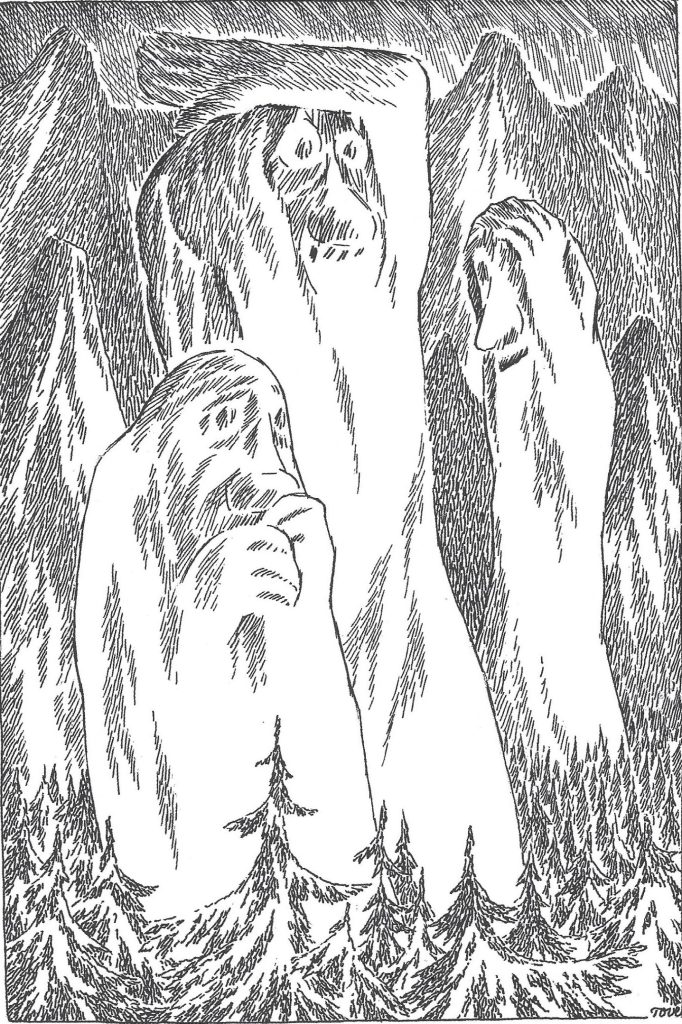 The Trolls. ©the estate of Tove Jansson
The Trolls. ©the estate of Tove Jansson
Jansson did her Hobbit illustrations for a 1962 Swedish edition (she was a member of Finland’s Swedish-speaking minority community) and they are refreshingly different from the more realistic renderings of Middle-earth and its inhabitants that are common today. She did twelve full-page black-and-white drawings for the book, another ten that cover half to a third of a page, and many smaller drawings that decorate the beginning or end of chapters.
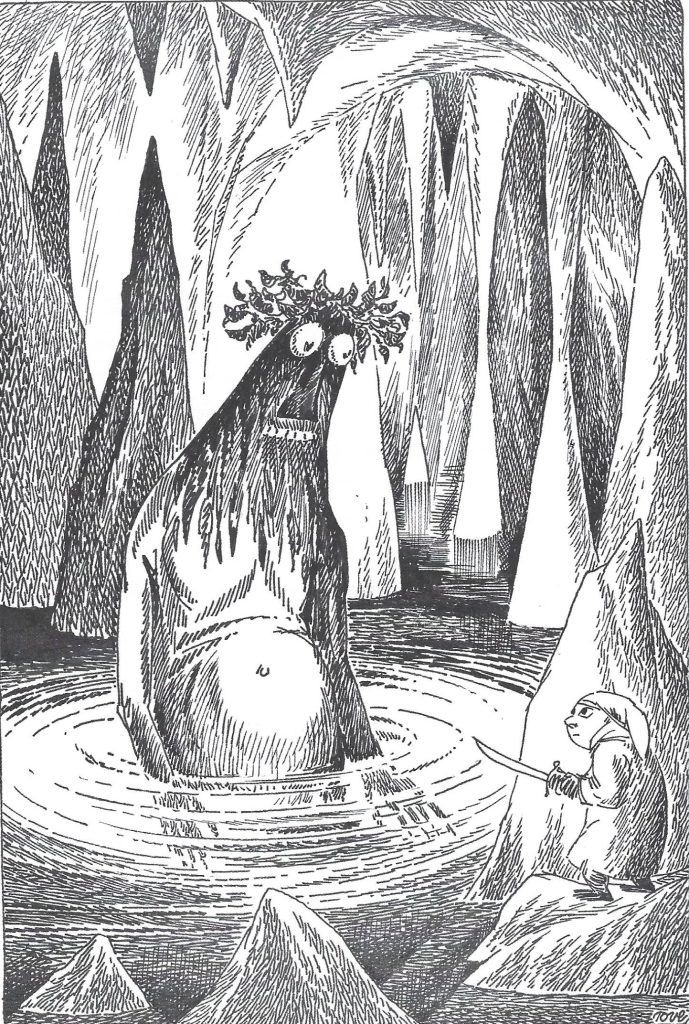 Bilbo and Gollum. ©the estate of Tove Jansson
Bilbo and Gollum. ©the estate of Tove Jansson
One thing that will immediately stand out to any Tolkien lover who flips through Jansson’s Hobitti is her visualization of Gollum. In Jansson’s drawings he’s huge, towering over Bilbo, and when Tolkien saw these illustrations, he supposedly realized that he had never specified exactly how large the slimy creature was, and so made the appropriate corrections for the Hobbit’s next edition, cutting Bilbo’s antagonist down to size.
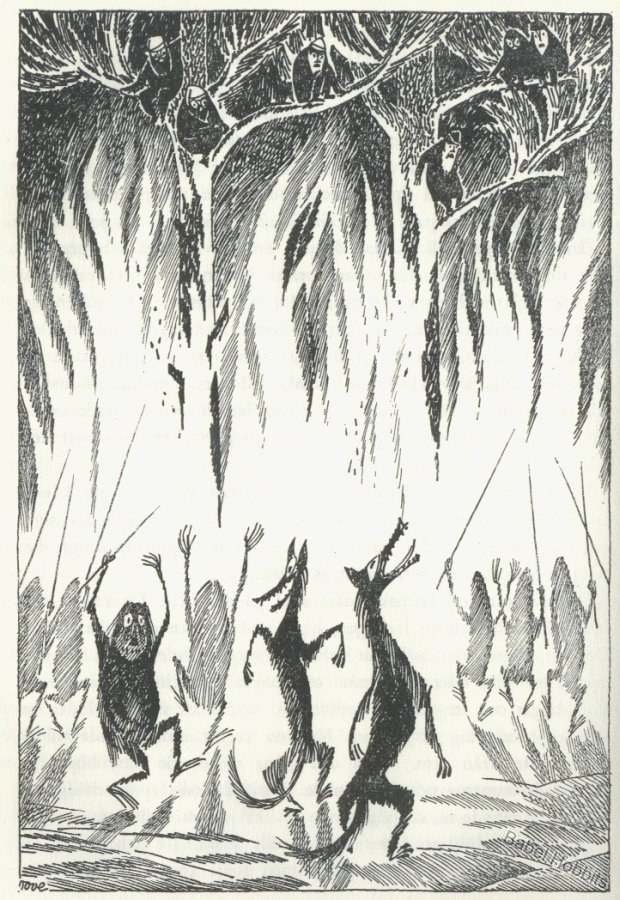 The Wargs. ©the estate of Tove Jansson
The Wargs. ©the estate of Tove Jansson
Jansson’s Tolkien illustrations are all her own; they’re not like any other rendition of Middle-earth that I can think of, and in comparing these wonderful pictures with more current ones, you can glimpse an older tradition, one that has its roots in the “North” that Tolkien loved, one that goes back to the sagas and Norse eddas that gave him his inspiration.
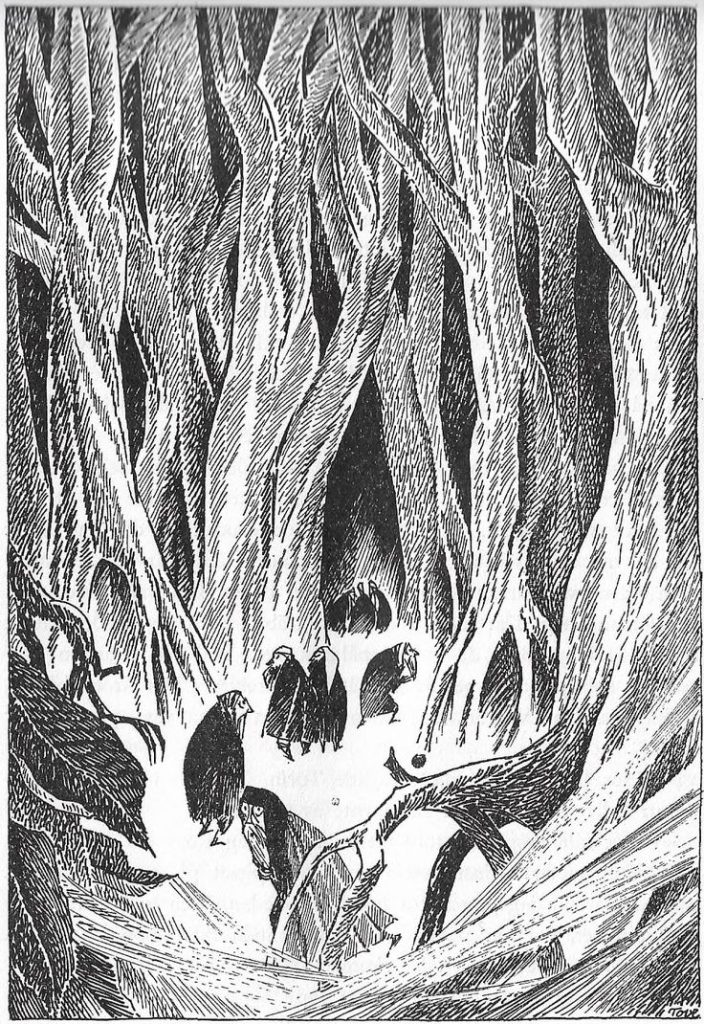 Mirkwood. ©the estate of Tove Jansson
Mirkwood. ©the estate of Tove Jansson
These simple-looking illustrations may not be to the taste of folks raised on fantasy photorealism (of course, in the hands of a true artist, there are few things deeper and more nuanced than simplicity), but I love them; their bold, expressionist lines combine the weird and the whimsical, the humorous and the beautiful, all with echoes of the heroic and the epic. I think Tove Jansson was a perfect match for Tolkien and his world.
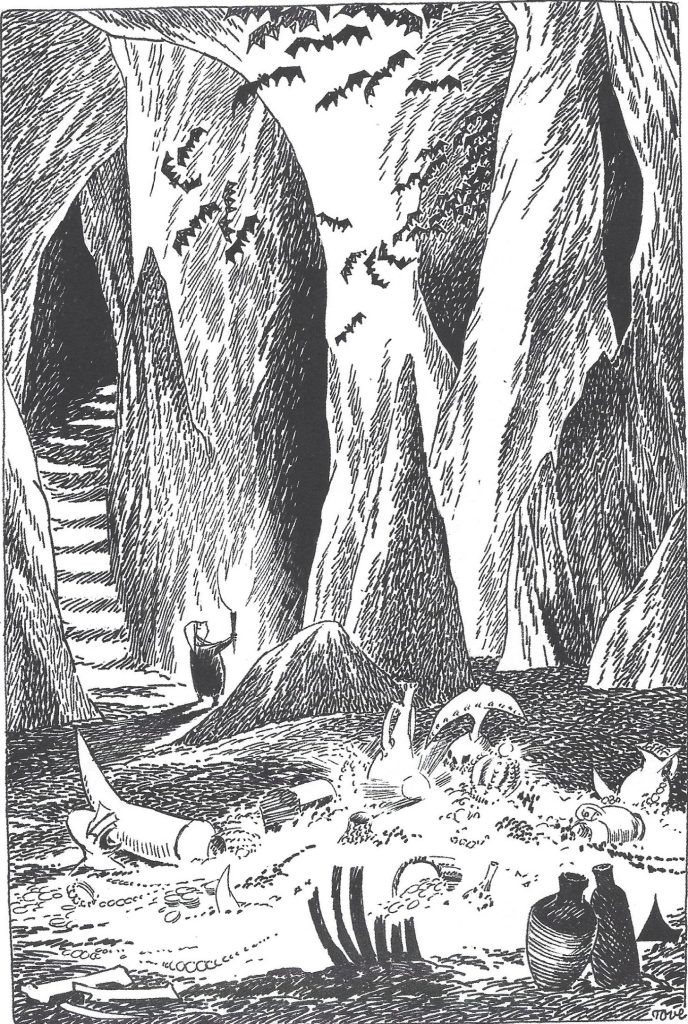 Smaug’s Treasure. ©the estate of Tove Jansson
Smaug’s Treasure. ©the estate of Tove Jansson
Just the other day I found out that Jansson did illustrations for Lewis Carrol’s Alice’s Adventures in Wonderland; NYRB Classics has just published a new edition featuring her drawings. Seeing what sparks Carrol’s story struck from Jansson is a rabbit hole I can’t wait to go down.
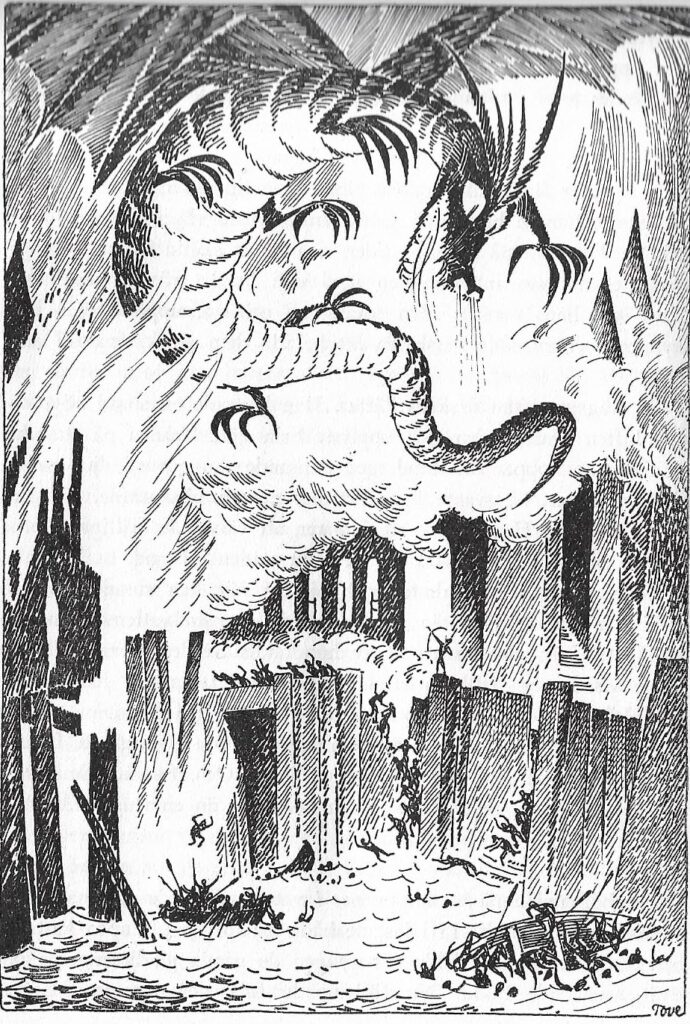 Smaug destroys Lake-Town. ©the estate of Tove Jansson
Smaug destroys Lake-Town. ©the estate of Tove Jansson
Until I can report back on Jansson’s Alice, I commend her Hobitti to you (her Moomin books, too), and I leave you with this:
Kaikki asekuntoiset ihmismiehet ja suurin osa haltiakuninkaan joukoista valmistautuivat marssimaan pohjoiseen Vuorta kohti. (What does that mean? I dunno, but it comes at the end of chapter Tulta Ja Vettä.)
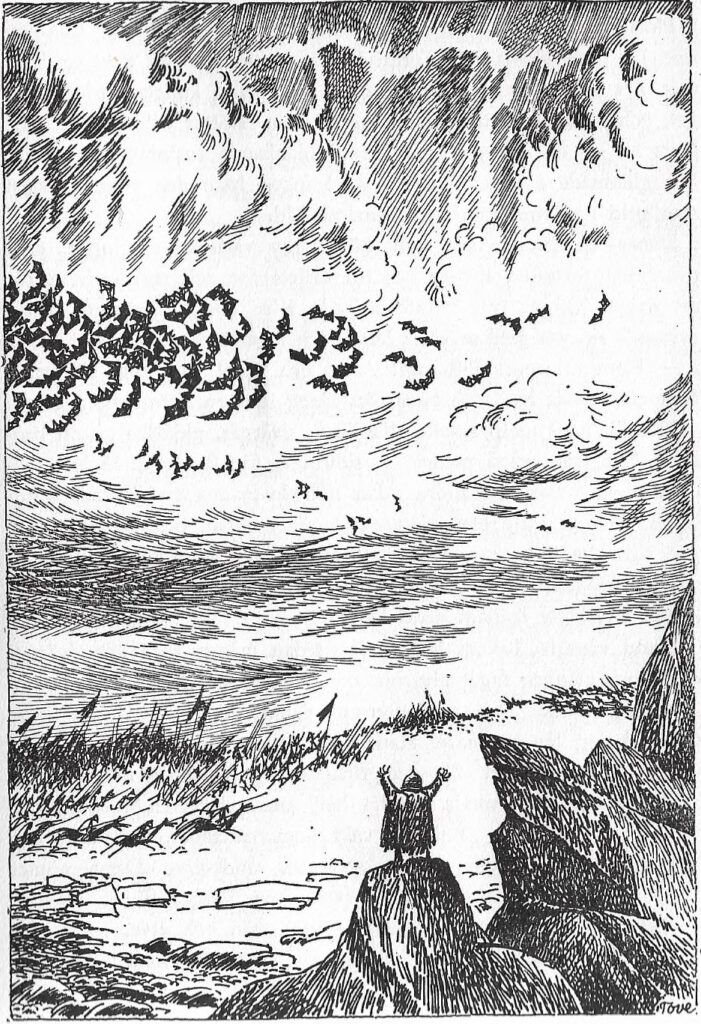 The Battle of Five Armies. ©the estate of Tove Jansson
The Battle of Five Armies. ©the estate of Tove Jansson
Thomas Parker is a native Southern Californian and a lifelong science fiction, fantasy, and mystery fan. When not corrupting the next generation as a fourth grade teacher, he collects Roger Corman movies, Silver Age comic books, Ace doubles, and despairing looks from his wife. His last article for us was The Lost World
7 Author Shoutouts | Authors We Love To Recommend
Here are 7 Author Shoutouts for this week. Find your favorite author or discover an…
The post 7 Author Shoutouts | Authors We Love To Recommend appeared first on LitStack.
Review: The Incandescent by Emily Tesh

Buy The Incandescent FORMAT/INFO: The Incandescent was published by Tor Books on May 13th, 2025. It is 432 pages long and is available in hardcover, ebook, and audiobook formats.
OVERVIEW/ANALYSIS: As the Director of Magic at Chetwood Academy, one of the most prestigious boarding schools in England, Dr. Walden's day is full of everything from faculty meetings to demons trying to break through the school's wards. She is constantly torn between keeping up on mundane admin while trying to stop idiot teenagers from messing with magic beyond their capabilities. But what is Dr. Walden to do when the greatest threat to the school might be herself?
The Incandescent is a fresh spin on the magical academia genre, where the overworked, underpaid faculty at an elite boarding school get to shine front and center. Nearly, if not all, magical academia books I have read have been from the POV of the students. I've seen plenty of books where a group of scrappy teenagers discovers a dark conspiracy afoot at their school. They sneak behind teachers' backs, dabble in a bit of forbidden magic or research, and generally defy authority, all in the name of saving the day.
But let's face it, many teenagers aren't noble heroes on a quest - they're idiots. Enter the exasperated staff of Chetwood Academy, trying to help shape students on their quest to discover their path in life, while also making sure they don't fall prey to demonic possession because they cut corners while drawing a summoning diagram. Dr. Walden and her staff are just as often trying to save the students from themselves as much as from outside threats, all while grading papers, offering career counseling, and managing the school's budget.
The Incandescent also takes a moment to examine and critique the whole structure of elitist boarding school culture. It examines the notion that what parents aren't paying for isn't really a top tier education; they're paying for their child to join the network of alumni scattered across the country and use that network for the rest of their lives. It's the social connections that truly matter to most parents, the security of knowing their child will have plenty of contacts who will open doors for them in the future. This in turn perpetuates systemic class disparities, as most often only those who can pay for the connections, get the connections.
I want to take a moment to note that while the marketing for this book makes a point of mentioning this is a sapphic story, you shouldn't expect a sweeping romance. Relationships are just one part of Dr. Walden's life, and certainly not the focus - which is good, because I found those romance dynamics one of the weaker parts of the story. On the one hand, I liked that Dr. Walden is grappling with the complications of juggling potential romance with the demands of her career. But there was just no chemistry between Dr. Walden and her love interest, leaving not particularly interested in what happened on that front.
CONCLUSION: The Incandescent is a worthy addition to the shelves of magical academia, and any fan of the genre should give it a read. It examines school culture from the rare perspective of the teacher, but it doesn't put forth that the teachers have all the answers; one of the best scenes is a student who challenges Dr. Walden's notion of how well their life situation and an elite boarding school education track go together. It gives you food for thought while also being an entertaining blend of school exams and demonic invasions, making The Incandescent a definite recommend.
Review of The Knight and the Moth by Rachel Gillig
As a Bookshop affiliate, I earn from qualifying purchases. The Knight and the Moth is the first book in The Stonewater Kingdom, a new gothic/romantic fantasy series by New York Times bestselling author Rachel Gillig. This was one of my most anticipated books of 2025 because One Dark Window, the author’s debut novel and the first book in The Shepherd King duology, was a fun, difficult-to-put-down story—and, as such, was one of my favorite books of 2022. Unfortunately, I was […]
The post Review of The Knight and the Moth by Rachel Gillig first appeared on Fantasy Cafe.Nosferatu: Was It the Time Change What Killed The Beast?
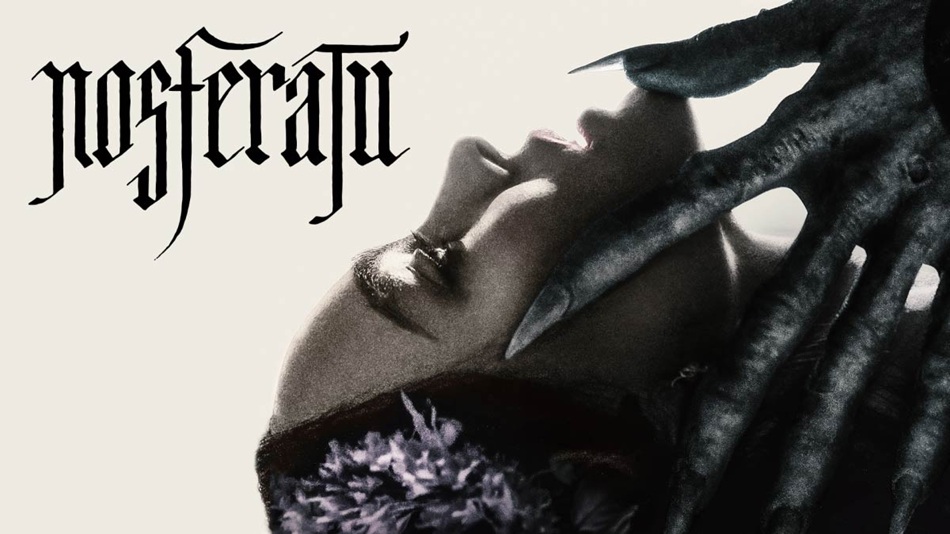 Nosferatu, written and directed by Robert Eggers, based on Nosferatu: A Symphony of Horror (1922), written by Henrik Galeen, and Dracula, penned by Bram Stoker in 1897.
Reboots and Adaptations
Nosferatu, written and directed by Robert Eggers, based on Nosferatu: A Symphony of Horror (1922), written by Henrik Galeen, and Dracula, penned by Bram Stoker in 1897.
Reboots and Adaptations
Okay. So I finally got around to watching Eggers’ version of FW Murnau’s classic from 1922, Nosferatu: A Symphony of Horror. By now, I think everyone knows the story behind FW Murnau’s Nosferatu, but here’s a brief summary: Murnau’s Nosferatu was an unauthorized adaptation of Bram Stoker’s Dracula, changing character names and locations but retaining the core plot elements. The film, which originally claimed to be adapted from Stoker’s novel, was made to avoid copyright issues and was eventually subject to legal action that nearly destroyed all prints.
Despite the name changes and some alterations, the film’s narrative largely follows Dracula’s journey, with the protagonist, Count Orlok (instead of Dracula), traveling to a new land — Romania to Germany, instead of Transylvania to England — and spreading a plague. Eggers’ reboot is definitely well made and impressive, and it has an other-worldly feel to it. It’s different from other vampire films. That being said, the original silent version is way creepier.
Now, allow me to digress for a paragraph or so. In 1979, there was a remake of the film — Nosferatu the Vampyre, known in Germany as Nosferatu: Phantom of the Night — directed by Werner Herzog and starring Klaus Kinski as Count Dracula. Yes, all Stoker’s character names were used in this film version. Not a bad film, but a bit anemic, you should pardon the pun. There’s also a fun flick from 2000 called Shadow of the Vampire, a fictional telling of the making of the silent Nosferatu, in which Willem Dafoe (who also has a role in Eggers’ version) stars as Max Schreck, the real name of the actor who first played Nosferatu. The twist is this: Max Schreck is a real vampire — a vampire playing a human actor who’s playing a vampire. (Sort of a Victor/Victoria, with blood.) Now where was I? Oh, yeah.
Expect SexFirst off… yes, sex is at the heart of Eggers’ Nosferatu. Sex is at the heart of Stoker’s novel, which was written in the sexually repressed Victorian Era. Sex plays a part in almost every vampire film I’ve ever seen. Francis Ford Coppola’s Bram Stoker’s Dracula (1992), for example, is loaded with sex and nudity, like the Three Brides feeding on Keanu Reeves, one of whom is Monica Bellucci. There’s also a wild scene between Dracula (Gary Oldman), in wolf manifestation, humping Lucy Westenra (Sadie Frost.) Then there’s the love scene between Mina Harker (Winona Ryder) and Dracula, where she licks his blood off his chest.
So there’s nothing new on the sexual theme and subtext of this latest version of Nosferatu. In fact, Nosferatu owes a lot to Coppola’s Dracula, a film I am quite fond of, in spite of some cringe-worthy acting, dialog and miscasting. Gary Oldman was fantastic; he owns that role and that film, just as Lily-Rose Depp, the real star of Nosferatu, owns this film. I’ll come back to her.
AtmosphereEggers’ Nosferatu owes a lot to Coppola’s Dracula in its use of shadows and some “camera tricks.” It also boasts some exquisite scenery and set design, which convey the ideal atmosphere for the story. The cinematography by Jarin Blaschke is masterful, the film score by Robin Carolan is spot on, and there are some haunting audio FX that add to the grimness of this film. The script pretty much follows the plot of the original screenplay by Henrik Galeen, but doesn’t owe much to Bram Stoker, other than his novel being the inspiration for the original, silent film.
I found this extended version to be a bit — (a bite?) — too long (in the tooth?) because it was almost deadly-dull at times. It moved as slowly as a corpse first waking up as one of the Walking Dead. The film spent too much time on mood and set up, and the first two acts I found to be somewhat tedious and boring. Not enough was happening! I did not find it at all exciting. It was like watching a pair of heroin addicts playing chess. The third act picked up some energy, but by then I was yawning. The plague of rats was pretty cool, though. There are a lot of rats in this film. I mean, a lot of rats.
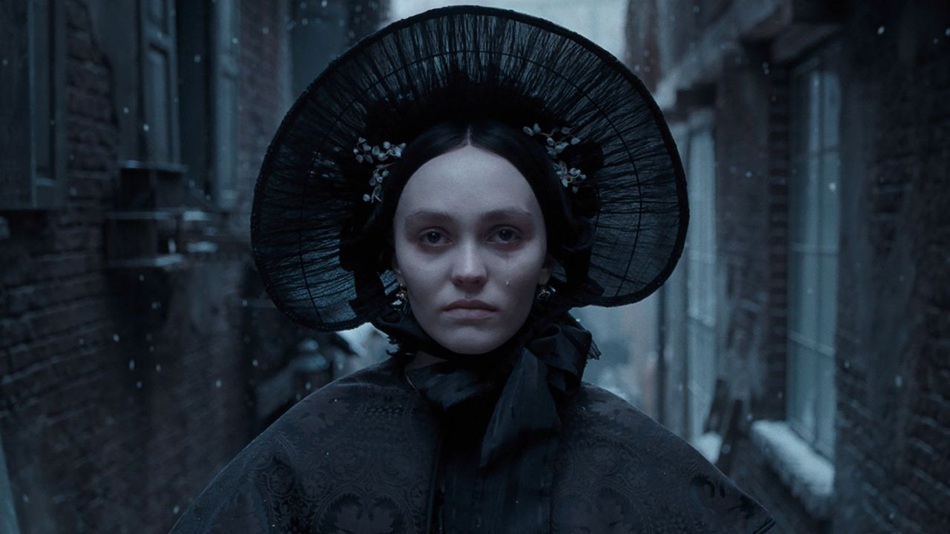 Lily Rose from Nosferatu 2024
Casting
Lily Rose from Nosferatu 2024
Casting
The cast was capable but not exceptional. They did their jobs and they did well enough. Willem Dafoe did a stand-up job, however, and in only one brief scene does he go over the top. I just couldn’t get emotionally attached or involved with any of the characters — except for Lily-Rose Depp. This is her film and she totally owns it. Her performance as Ellen Hutter (Mina Harker, in Stoker’s novel) is powerful and spot-on in every scene. She nails it and steals the show. She is put through the emotional ringer in this film — loving, angelic, quirky, possessed, demonic — you name it, she throws it all up there on the screen. She blew me away with a solid, heroic performance that was never over-the-top. She was brilliant. Her self-sacrifice in the final act is a powerful scene, and a sad one, as well.
As for the two kids who play the children of Anna Harding and Frederich Harding (Emma Corrin and Aaron Taylor-Johnson) I found them to be as annoying as a blister on the tip of my big toe, and when Nosferatu feeds on them, I cheered him on. It’s a brief, darkly-lit scene that quickly shift’s to Anna who sees her children being devoured, and the look on her face and her scream of horror, followed by her final fate, is chilling. That was a good bit. As for Bill Skarsgård, the other major player in Nosferatu and the title character…
I’m a fan. I’ve enjoyed his work in such films as John Wick, The Crow, and as Pennywise in the theatrical version of Stephen King’s IT — a feat of acting that, considering Tim Curry’s wonderful Pennywise, I applauded because he made the role his own: his Pennywise was the only good thing about that version of King’s novel.
But as for his take as Nosferatu… it didn’t work for me at all. I did not care for the make-up or the way he portrayed the character. There was nothing “supernatural” about him. He was just a force of evil, more like a big, hulking brute… and maybe that’s what Eggers wanted. I know The Last Voyage of the Demeter was not very well received, but I enjoyed that film and got a genuine sense of Dracula as being demonic, sorcerous, powerful, and evil. I didn’t get any sense of what Nosferatu felt for Ellen (Mina), no lost love, no real idea of why he wanted her, nothing about her being the reincarnation of a lost love. He says something about her not being of this world, of not being human or belonging to the living world — whatever. I must have missed something about how they were connected, but I’m not going back to “watch again,” at least not for the time being.
When Skarsgård’s dialog was in Romanian, it was subtitled in English. But when he spoke English, his accent was very difficult for me to understand. I was like, “What the hell is he talking about?” I kept expecting the villagers from Young Frankenstein to show up and shout in unison: WHAT?
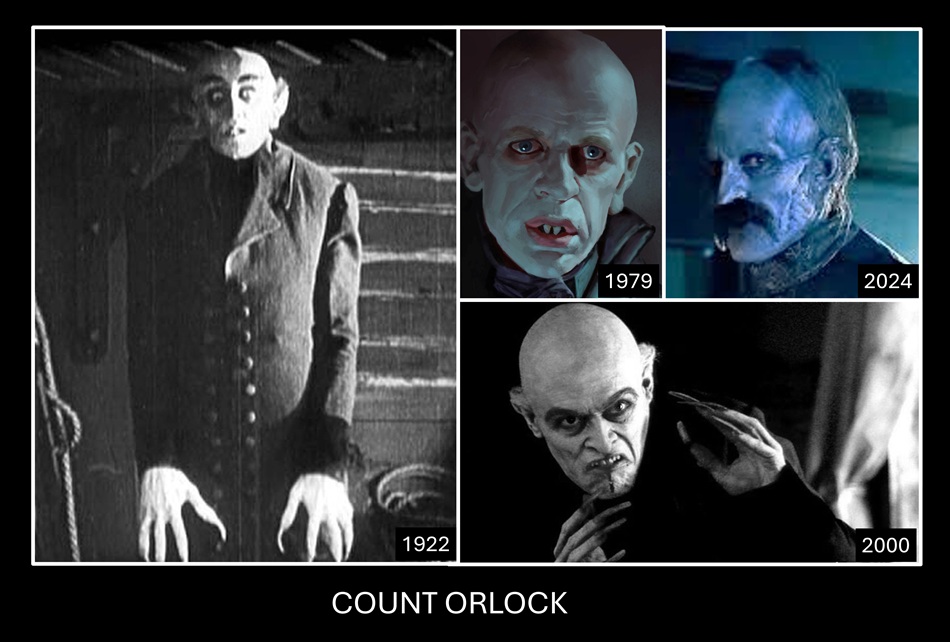 1922 MAX SCHRECK Nosferatu; 1979 KLAUS KINSKI Nosferatu the Vampyre; 2000 WILLEM DAFOE Shadow of the Vampire; 2024 Bill Skarsgård Nosferatu
Omnipotent Vampire Ignores Chicken, Dies
1922 MAX SCHRECK Nosferatu; 1979 KLAUS KINSKI Nosferatu the Vampyre; 2000 WILLEM DAFOE Shadow of the Vampire; 2024 Bill Skarsgård Nosferatu
Omnipotent Vampire Ignores Chicken, Dies
Now, here’s the problem I always had with the original version of Nosferatu, and with this one, too. I find it funny that an ancient, demonic, powerful vampire could become so besotted with blood and sex that he doesn’t see the sun rising and doesn’t pay attention to the cock’s first crowing. By the time of the second crowing, it’s too late. Didn’t he see or feel the sunlight shining through that honking-big window? Did he leave his watch at home? Did he forget about the time change? Or… maybe he knew that there was nowhere he could run and hide, because the coffin(s) full of his native soil had been destroyed. Or was this his fate, his desire — to perish in the arms of Ellen Hutter? I think that was it, because he could have let anyone destroy him at any time, if he wanted death and oblivion, but he wanted her to be his doom, he wanted to take her with him, to be with him forever in death. But what do I know? I’m not a real film critic. I’m just hear to entertain you Black Gate readers.
Check Out My DisappointmentI do not hate or dislike this version of Nosferatu. I am just disappointed in it. All the hype about this film, the word-of-mouth, gave me expectations of something I imagined would be a revelation, a landmark in moving pictures and vampire flicks in general. Thus, not getting what I expected, I was disappointed. It happens. And that’s on me. But if you haven’t seen the film, don’t let my review stop you from doing so. Check it out. You might like it. I’m sure I’ll watch the film again. Maybe it will grow on me. There are many favorite films I did not enjoy on first viewing, and vice versa, too. Anyway, Nosferatu was a big hit, it’s popular and made lots of $$$$$, so that should tell you something. One thing I do know… Lily-Rose Depp is going to have one helluva fine film career. I look forward to seeing her in more films.
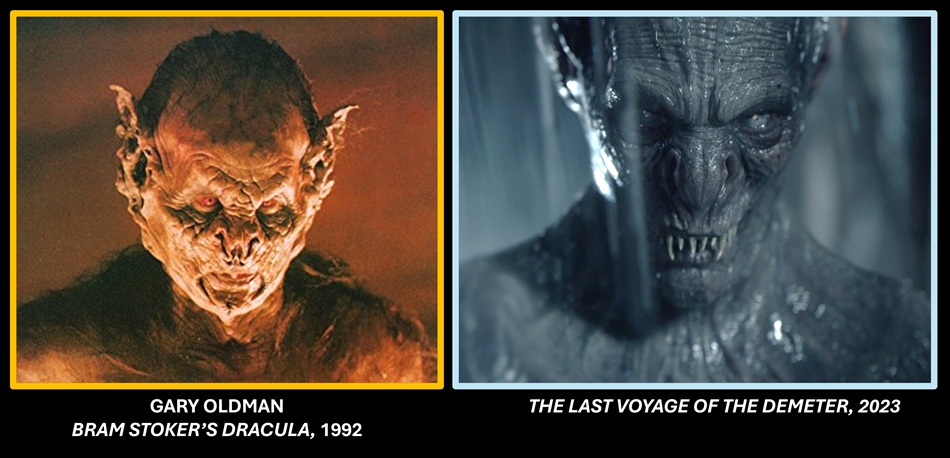 Left: GARY OLDMAN – BRAM STOKER’S DRACULA, 1992 Right: THE LAST VOYAGE OF THE DEMETER, 2023
Left: GARY OLDMAN – BRAM STOKER’S DRACULA, 1992 Right: THE LAST VOYAGE OF THE DEMETER, 2023
Joe Bonadonna is the author of the heroic fantasies Mad Shadows — Book One: The Weird Tales of Dorgo the Dowser(winner of the 2017 Golden Book Readers’ Choice Award for Fantasy); Mad Shadows — Book Two: The Order of the Serpent; Mad Shadows — Book Three: The Heroes of Echo Gate; the space operaThree Against the Stars and its sequel, the sword and planet space adventure, The MechMen of Canis-9; and the sword & sorcery pirate novel, Waters of Darkness, in collaboration with David C. Smith. With co-writer Erika M Szabo, he penned Three Ghosts in a Black Pumpkin (winner of the 2017 Golden Books Judge’s Choice Award for Children’s Fantasy), and its sequel, The Power of the Sapphire Wand.
He also has stories appearing in: Azieran: Artifacts and Relics; Savage Realms Monthly (March 2022); Griots 2: Sisters of the Spear; Heroika I: Dragon Eaters; Poets in Hell; Doctors in Hell; Pirates in Hell; Lovers in Hell; Mystics in Hell; Liars in Hell; Sinbad: The New Voyages, Volume 4; Unbreakable Ink; Poetry for Peace; the shared-world anthology Sha’Daa: Toys, in collaboration with author Shebat Legion; and with David C. Smith for the shared-universe anthology, The Lost Empire of Sol.
In addition to his fiction, Joe has written numerous articles, book reviews and author interviews for Black Gate online magazine.
“Measure of Devotion” Measuring an Outcome | Love, War, and Surrender
LitStack is excited to share Allie Coker’s review, an engaging exploration of the characters, key…
The post “Measure of Devotion” Measuring an Outcome | Love, War, and Surrender appeared first on LitStack.
THE NIGHT BIRDS by Christopher Golden
Spotlight on “A Promise to Arlette” by Serena Burdick
A Promise to Arlette has the heart of a thriller, an evocative historical novel following…
The post Spotlight on “A Promise to Arlette” by Serena Burdick appeared first on LitStack.




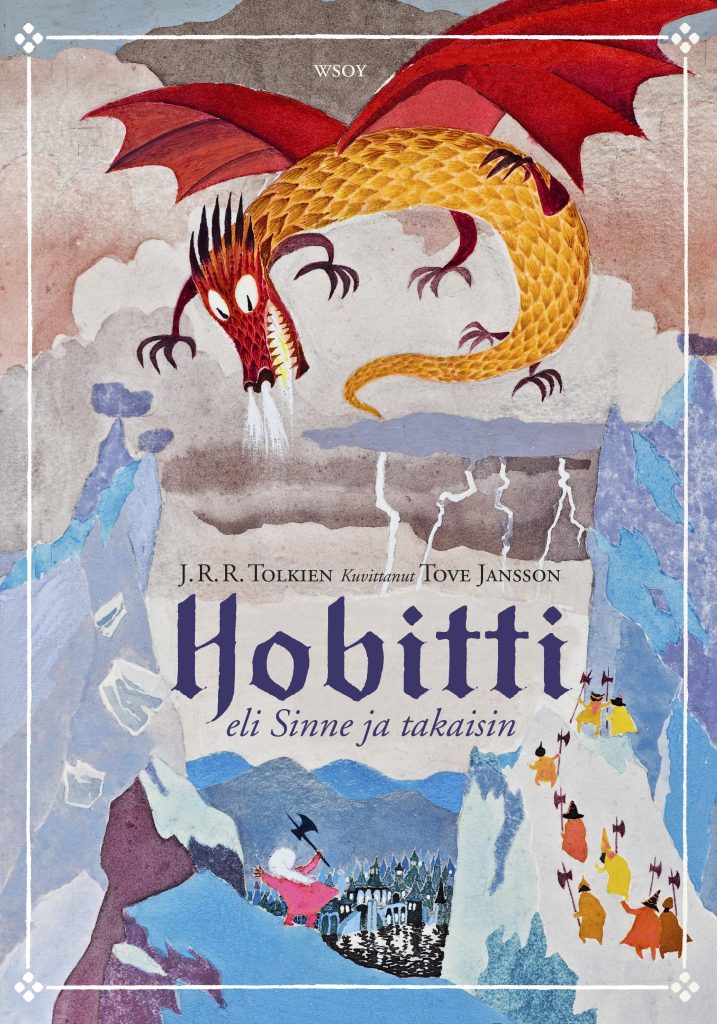
Recent comments